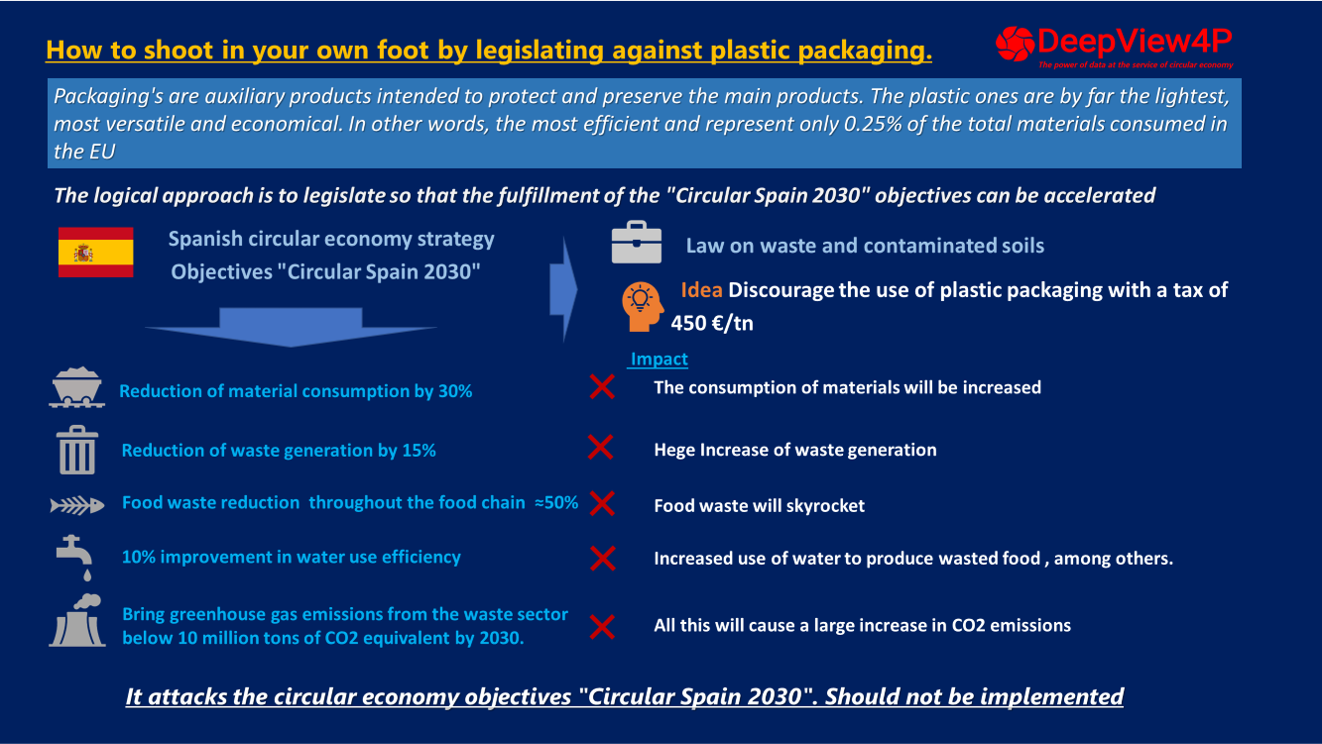Italy & Spain plan 450 €/tn tax on plastic packaging
Same amount, although there are some differences between the two countries. I will focus on Spain to explain the consequences.
The Spanish circular economy strategy “Circular Spain 2030” set the following objectives:
- Reduction of material consumption by 30%
- Reduction of waste generation by 15%
- Reduction of food waste throughout the food chain ≈50%
- 10% improvement in water use efficiency
- Reduction of greenhouse emissions from the waste sector below 10 Mio tn CO2 equivalents
These objectives are aligned with those of the EU and achieving them is not an option but a duty that we must take very seriously and without delay.
Moving towards a circular economy and decarbonization are key objectives included in the “European Green Deal”
All legislative initiatives should be directed towards achieving these objectives
The most rational would be, to concentrate efforts on those materials/products with the greatest environmental impact.
Instead, the focus is on plastics that only represent 0.7% of total materials, 1% of total waste and 19% of total packaging waste. The-power-of-data-against-the-mirage-of-false-perceptions
This is the consequence of the crusade that has been organized for years against plastics, without any scientific rigor and focused on single-use products and packaging.
Brexit occurs, and the EU to compensate part of the lost income decides to implement a 800 €/tn tax on the non-recycled plastics packaging quantities, that countries have to pay from 2021. The EU estimates to raise €5,900 Mio of which Spain will have to pay about €530 million.
It is a tax on a criminalised product, so no one is going to complain and is to be paid by the companies that bring packaging or semi-finished goods such onto the market. In practice, consumer will pay the tax.
Any tax, especially if it is so high, has some positive and some negative consequences.
- In my humble opinion, the EU tax promotes recycling and is well placed as it acts directly on the problem to be solved.
- But it is discriminatory since it only affects plastics. If they had put it in for all the materials that are not recycled, they would raise more, and it would be more effective
- A big mistake is to leave it to each country to collect the amount as it sees fit. Each country could take a different path, which could undermine market unity and create serious imbalances.
Spain the 530 million shall be offset through a 450 €/tn tax on single-use packaging and a very small amount on non-recycled quantities deposited in landfill. Although it seems incredible it also affects biodegradable and compostable plastics. This is not the case in Italy
The quantity of recycled raw material may be deducted from the tax without any limit. If a container is manufactured with 100% recycled raw material, you would not pay the tax.
Two additional objectives are pursued
- Disincentivize plastic packaging consumption (it seems other materials are welcome and can be used massively)
- Promote the use of recycling
It seems to be forgotten that we are in CLIMATIC EMERGENCY, and we cannot afford mistakes that aggravate emissions.
Let us look at the consequences
- Discourage the consumption of plastic packaging
Remember: Packaging is an auxiliary product intended to protect and preserve the main products!! Plastic ones are the lightest, most versatile, cheapest and only represent 0.25% of the total materials consumed. A no-brainer that seems to be forgotten.
Impact
If the use of plastic packaging is eliminated:
The net balance of its disposal will be a disaster due to breakages, contaminations and reduced shelf life of the main products.
- Material consumption would rise
- Waste would increase
- Food waste would increase
- CO2 emissions would skyrocket
- Increased water consumption
Replacement of plastic packaging with other materials
Plastic packaging’s are by far the lightest any substitution goes against the objectives “Spain Circular 2030” and would generate
- Increased consumption of materials
- Increased waste generation
- Increased CO2 consumption
Reuse: Some plastic packaging could be redesigned to be reused, but this would certainly generate:
- Increase in the consumption of materials as they would be heavier and washing and sanitization facilities would have to be built.
- Increased consumption of water, energy, detergents ect for preparation for reuse
- Increase in CO2 emissions due to all the above and reverse logistics
- Studies show that it is not environmentally sustainable to reuse very light products
In a nutshell, this tax goes against the “Circular Spain 2030” strategy in addition to being discriminatory and alters free competition.
Legislators would do well to reconsider and move it to the non-recycled quantities of all kinds of packaging not only plastic packaging
- Encouraging the use of recycling
It will certainly strongly incentivise the use of recycling, but it would also be strongly incentivized if the tax were imposed on non-recycled quantities.
It is important to support the recycling industry to extract maximum value from plastic waste. The use of new technologies such as deep cleaning for use in contact with food, purification, solvosis ect must be promoted to the maximum.
It will be key to ensure that all recyclers have equal access to plastic packaging waste and converters to the recycled raw material, otherwise serious market distortions could be created.
Alternative Proposals
- Tax of 800 €/tn on all non-recycled packaging regardless of the material with which they are manufactured.
- Closure of all landfills within a maximum period of 5 years.
- Promote research and development of recycling technologies.
- Encourage the research and development of new packaging that help reduce food waste and the loss of any product. Fruits and vegetables are perfect candidates as they are among the most wasted products
- Encourage the use of more efficient packaging. Ratio Empty container weight/ Net content
- Require an LCA for all packaging. This is the best way to choose the packaging with the lowest environmental impact.


